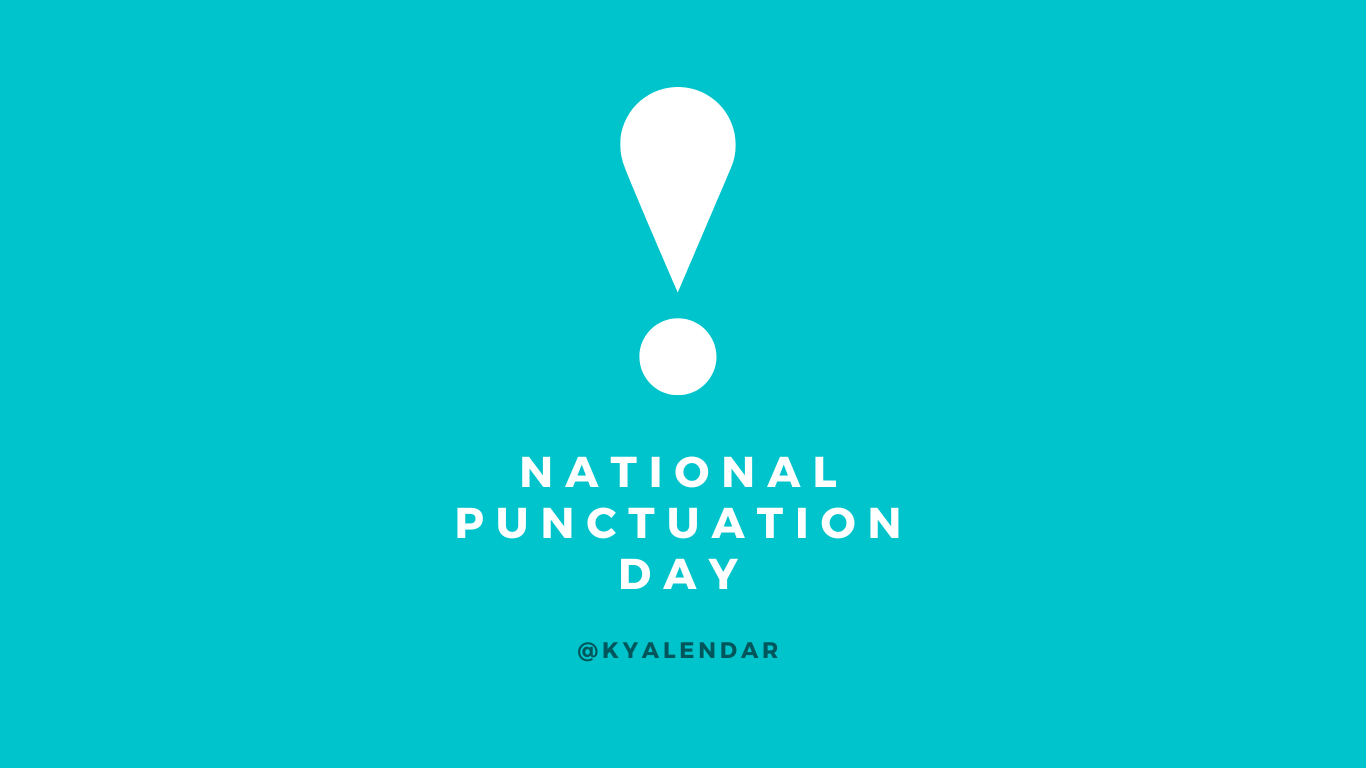
- This event has passed.
National Punctuation Day
September 24

National Punctuation Day is an annual observance dedicated to recognising and celebrating the importance of punctuation in written communication. Celebrated on September 24th, this day highlights how punctuation marks are essential for clarity, coherence, and the effective conveyance of ideas in both professional and personal writing.
The Importance of Punctuation
Punctuation plays a vital role in writing, serving as the traffic signals of language. It helps guide readers through text, indicating pauses, stops, and the structure of sentences. Without proper punctuation, written communication can become confusing, ambiguous, or even misleading. Here’s a closer look at why punctuation is so crucial:
- Clarity and Understanding: Punctuation marks, such as commas, periods, and question marks, help clarify the meaning of sentences. They provide necessary pauses and breaks that guide readers through the text, ensuring that the message is conveyed accurately.
- Emphasis and Tone: Punctuation can alter the tone of a sentence and highlight emphasis. For instance, an exclamation mark can convey excitement or urgency, while a question mark indicates a query. Correct use of punctuation helps convey the writer’s intended emotion and tone.
- Structure and Organisation: Punctuation helps structure writing by organising ideas into coherent and logical sequences. It separates clauses, lists, and phrases, making text more readable and easier to follow.
- Avoiding Misunderstandings: Proper punctuation helps prevent misunderstandings by ensuring that sentences are interpreted as intended. For example, a misplaced comma can change the meaning of a sentence significantly, leading to confusion or miscommunication.
Celebrating National Punctuation Day
National Punctuation Day is a chance to celebrate and appreciate the nuances of punctuation. Here are some engaging ways to observe and honour this day:
- Educational Activities: Schools and educational institutions often host activities to teach students about the importance of punctuation. This might include punctuation quizzes, games, or workshops that focus on the correct use of punctuation marks.
- Writing Challenges: Writers and readers can participate in writing challenges that emphasise correct punctuation usage. These challenges might involve crafting sentences with specific punctuation marks or editing passages to improve punctuation.
- Social Media Campaigns: Social media platforms offer a great opportunity to spread awareness about National Punctuation Day. Sharing tips, infographics, and fun facts about punctuation can engage a wider audience and promote better writing practices.
- Punctuation Parties: Some people organise punctuation-themed parties or events, where participants might dress up as their favourite punctuation marks, play punctuation-related games, or discuss the quirks of punctuation in a fun and interactive setting.
- Resource Sharing: Libraries, bookstores, and online platforms can provide resources such as guides, books, and articles on punctuation. Sharing these resources helps educate others about the significance of punctuation and how to use it correctly.
The Evolution of Punctuation
The use of punctuation has evolved over time, with different marks emerging to address the needs of written language. Here’s a brief overview of some key punctuation marks and their roles:
- The Period (.): Used to indicate the end of a declarative sentence, the period is a fundamental punctuation mark that provides a full stop to a thought.
- The Comma (,): Commas are used to separate items in a list, set off introductory elements, and clarify meaning within sentences. They are essential for preventing run-on sentences and ensuring readability.
- The Question Mark (?): This mark indicates a direct question and helps differentiate between statements and inquiries.
- The Exclamation Mark (!): Used to express strong emotions or emphasise a point, the exclamation mark adds intensity to statements.
- The Semicolon (;): A semicolon connects closely related independent clauses and helps to clarify complex sentences.
- The Colon (:): Colons introduce lists, quotations, or explanations, providing a pause before elaboration.
- The Apostrophe (’): Apostrophes indicate possession or contractions, helping to show ownership or combine words.
- Quotation Marks (“ ”): Quotation marks are used to enclose direct speech, quotes, or titles of short works.
The Future of Punctuation
As language continues to evolve, so too does the use of punctuation. Digital communication, such as texting and social media, has introduced new forms of punctuation and shorthand, reflecting changes in how we communicate. Despite these changes, the fundamental principles of punctuation remain crucial for clear and effective writing.
In conclusion, National Punctuation Day is an opportunity to celebrate the indispensable role of punctuation in written communication. By recognising the importance of punctuation, we enhance our writing skills and ensure that our messages are conveyed with clarity and precision. Whether through educational activities, social media engagement, or simply reflecting on the role of punctuation, this day serves as a reminder of how these often-overlooked marks make a significant impact on our ability to communicate effectively.